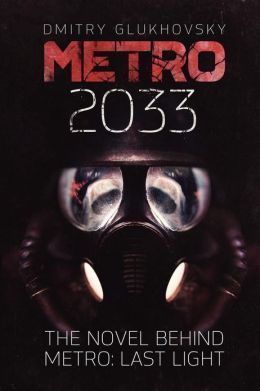The premise of Metro 2033 is excellent, and the ultimate conclusion of the story (the last 10 pages), though treading on an overused SF trope, could have added an excellent undercurrent to the plot. Yet, in-between the opening and the ending, there is over 400 pages of, well, nothing. After introducing the setting, the main character, Artyom, is sent on a quest by someone he just met, for reasons which are not elaborated upon, to the ultimate purpose of doing...something. That's a great way to start a journey, isn't it?
For the rest of the book, Artyom simply wanders around the metro system tunnels and stations, trying to get to his goal. Every now and then, he goes on rambling, nearly incoherent philosophical rants about the nature of humanity--presented with incredibly juvenile thinking, as though it were written by a moody high-schooler. He meets people, then they leave after a few pages. And there doesn't seem to be any overall plot that ties it together, other than his loosely defined "quest." To quote the book, "it just went on and on."
This, as a finished novel, reads like a rough draft. He rambles on for ages about Artyom's travels through the metro, yet the motivation for his doing so seems sketchy, at best, until the last 10 pages. Characters are barely developed, and are then tossed aside, as soon as they have any personality. Locations have only minimal descriptions, likely assuming that you're already familiar with what the Russian subway system looks like--I shouldn't have to look things up on Google Images to understand what an author is talking about. None of it manages to come together and form a cohesive world. It's a large jumble of fragmented good ideas; and it seems the author had to include every single one of his good ideas, without thinking about whether or not they were appropriate or useful to the narrative. I also have a tough time buying into the idea of everything on the surface mutating into super monsters within a single generation after nuclear war. This may be fantasy, but COME ON! At least give us a believable timeline.
I could have probably given this 2-stars, expect for the fact that all of the good ideas the book presents are utterly wasted. I've mentioned a few times how it quickly wraps up in about 10 pages, and that's the problem: the ideas in those 10 pages should have been everywhere else in the novel. You can't have a compelling conclusion when there is no build up to it. Simply stating, "This is what it was all about," is the worst kind of lazy writing. I was appalled at how wasteful this book was of its ideas, characters, setting and, most importantly, my time.
All this is without even mentioning the massive amount of typos, grammatical errors, wrong names, and general sloppiness of the English translation. Perhaps I should have played the video game version, instead. At least then I would have been able to kill things, which is what I wanted to do upon finishing this novel.




